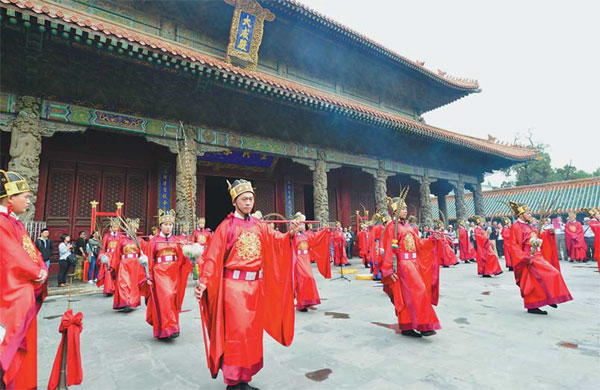Shandong welcomes 'historians Olympics'
|
A ceremony is held at the Confucius Temple in the philosopher's hometown of Qufu to honor China's ancient sage. Ju Chuanjiang / China Daily |
International Congress of Historical Sciences to be hosted in Asia for its first time
Shandong, the home province of famous Chinese philosophers Confucius and Mencius, is welcoming thousands of historians from around the world this month.
"Just as Confucius said 2,500 years ago, 'How delightful it was to have friends coming from afar', we warmly welcome scholars for the upcoming 22nd International Congress of Historical Sciences," said Guo Shuqing, the governor of Shandong.
The conference has taken place every five years since 1900 and enjoys a reputation as the "Olympics of historians". This year's event will open in Jinan, the capital of Shandong, on Aug 23 and more than 2,600 scholars from 88 countries and regions will have in-depth discussions on historical science issues in six cities during the following seven days.
"The world's most influential academic event on historical sciences, the conference is being held in an Asian country for the first time in the past 100 years. We will seize the opportunity to raise Shandong's international image and showcase its long history and profound culture to the world," Guo said.
A peninsula between the Bohai and Yellow seas, Shandong has a land area of 156,700 square kilometers and a coastline of 3,024 km. It is endowed with abundant natural resources including gold, coal, petroleum and gypsum.
Shandong is one of China's important agricultural bases, with its yields of grain, cotton, vegetables and aquatic products all leading the nation.
The geographical and natural advantages create great development potential for the province with a population of 91.25 million. Local government statistics show that last year, the province's GDP totaled 5.94 trillion yuan ($928.7 billion), an increase of 8.7 percent from 2013, making it China's third-largest economy.
Shandong also boasts a long history and fascinating culture. It is not only the birthplace of Confucius and Mencius but also of Sun Tzu - the author of The Art of War.
"Shandong is one of the birthplaces of Chinese civilization," said Fang Hui, head of the school of history and culture at Shandong University. The university is one of sponsors and hosts of this year's international congress of historical sciences.
"Confucianism and other philosophies developed by ancient sages here have played an important role in China's history and have a great influence on world civilization," Fang said.
Shandong has 10 nationally renowned historical and cultural cities, which ranks the province second in the country. They are Jinan, Liaocheng, Tai'an, Qufu, Zoucheng, Linzi, Qingzhou, Penglai, Yantai and Qingdao.
"During the weeklong congress, we will have six themed discussions in Jinan - the main venue - and another five historical and cultural cities, to display their unique culture and history to the world," Fang said.
Participants in the congress will focus on world historical and cultural heritage items in Shandong, including Mount Tai in Tai'an, the Grand Canal in Liaocheng and the Confucius Temple in Jining.
The province's rich historical and cultural resources appeal to visitors from both home and abroad and have become the biggest selling point for its tourism industry.
Last year, Shandong received more than 450 million inbound visits, generating 580 billion yuan in revenue.
The province is now promoting 10 cultural tour attractions, including Qufu, the hometown of Confucius; Mount Tai; the Yellow River; Jinan, the "capital of springs"; and Dongping, the setting for the classic novel Outlaws of Marsh, attributed to Shi Nai'an.
The local government is striving to build the province into an international tourist attraction, with tourism revenue expected to exceed 1 trillion yuan by 2017, doubling that of 2012.
Wangqian2@chinadaily.com.cn


 Shandong Culture and Tourism Consumption Season
Shandong Culture and Tourism Consumption Season Culture, tourism sectors pick up in Shandong as epidemic wanes
Culture, tourism sectors pick up in Shandong as epidemic wanes

